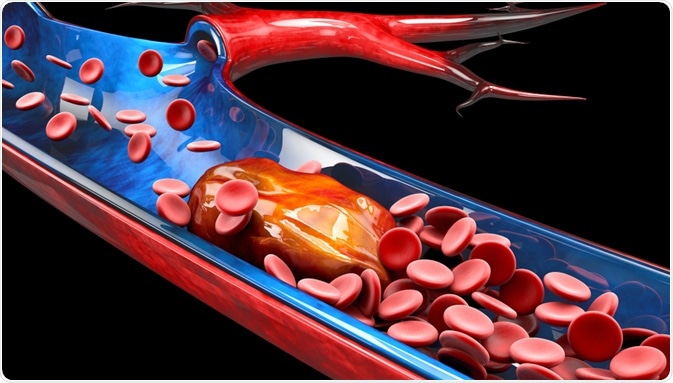Thrombosis is a process involving the formation of a clot in the bloodstream and is classified into several different types according to the location of the thrombus.
The two broad classifications are venous thrombosis and arterial thrombosis, depending on whether the clot was developed in an artery or a vein. Within these categories, there are several subtypes of thrombosis.

Image Credit: Victor Josan / Shutterstock.com
Types of venous thrombi
Deep vein thrombosis
Deep vein thrombosis (DVT) commonly involves the formation of a blood clot in the femoral vein of the leg and is the most common type of thrombosis to cause serious complications. If the thrombus breaks off to form an embolism, it moves within the blood towards the lungs and commonly causes pulmonary embolism.
Typical signs of a deep vein thrombosis include pain, swelling, and redness in the legs. If these are noted and DVT is suspected, assessment and management should be conducted as soon as possible to reduce the possibility of pulmonary embolism.
Portal vein thrombosis
A portal vein thrombosis occurs in the hepatic portal vein, can cause portal hypertension, and affect the blood supply to the liver. In most cases, this type of thrombosis results from other abnormalities in the body, such as pancreatitis, cirrhosis, diverticulitis, or cholangiocarcinoma.
Renal vein thrombosis
The renal vein can also be obstructed by a thrombus, which can result in reduced kidney drainage. This type of thrombosis is known as renal vein thrombosis and is common in patients with nephrotic syndrome.
Jugular vein thrombosis
Thrombosis of the jugular vein is an extremely rare type of venous thrombosis that usually occurs as a result of intravenous drug use but is also associated with infection and malignancy. Individuals affected by this type of thrombosis may develop serious complications such as systemic sepsis, pulmonary embolism, and papilledema.
Budd-Chiari syndrome
Budd-Chiari syndrome is a type of venous thrombosis that causes obstruction of the hepatic vein and the outflow of blood from the liver. It is uncommon but may be recognized by symptoms of abdominal pain, ascites, and hepatomegaly.
Paget-Schroetter disease
Also known as effort thrombosis, Paget-Schroetter disease refers to thrombosis occurring in an upper extremity vein, such as the axillary or subclavian veins. This condition usually affects physically active people and typically presents immediately after or during high-intensity exercise.
Cerebral venous sinus thrombosis
A cerebral venous sinus thrombosis is a rare type of stroke that is caused by a thrombus in the venous channels of the brain. This type of thrombosis is characterized by headache, abnormal vision, and some of the typical symptoms of stroke, such as difficulty speaking and moving the facial and arm muscles. The majority of people make a full recovery; however, adequate treatment, as for a stroke, is required to promote healthy recovery.
Arterial thrombi
Thrombotic stroke
A thrombotic stroke is a type of arterial thrombosis that causes a blockage in the cerebral artery that is responsible for supply blood and oxygen to the brain. Thrombotic stroke usually presents more gradually as compared to other types of stroke, such as hemorrhagic, due to the gradual build up of the thrombus and the growing obstruction.
Myocardial infarction
A myocardial infarction can result from several causes but often arises as a result of arterial thrombosis in the coronary artery. This has the potential to be fatal and requires immediate medical attention to address the cause and limit damage to the muscle cells of the heart.
References
Further Reading
Last Updated: Mar 24, 2021